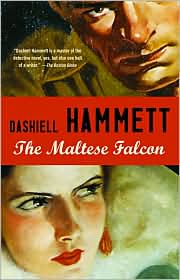
Here he is in his full glory: the hard-boiled private detective, a man of action and a man who follows his own code. While he may be a throwback, the character of Sam Spade epitomized what it meant to be a man in a man's world: drinker of liquor, fighter of men, lover of woman, and solver of crimes (and not necessarily in that order). I don't know much about the reaction to Dashiell Hammett's novel when it was first released, but I imagine that it was not considered proper literature in 1929. The book features a main character who is fairly non-plussed about the murder of his partner, is revealed to have been having an affair with that partner's wife, drinks, seduces young women, and routinely operates outside the authority of the police. In addition, there is a subplot that revolves around homosexuality and scenes that include Spade looking at nude women. No wonder this stuff was called pulp fiction!
The story itself follows Spade's attempts to figure out why so many people are interested in the titular bird, a sculpture that is clearly of value. It opens with the classic set up: a beautiful young woman enters the office of the private eye looking for help in something that she is none too truthful about. Double crosses, imminent personal danger, international miscreants and meddling cops come and go in this textbook plot. The real value of the story is the introduction of one of the most indelible characters in literature and film, Sam Spade himself. Although Hammett wrote other detective novels, this is the only one that features Spade.
Spade is almost symbolic of America's image of itself from the time it was written. Here was a new type of hero- one who rejected the old ways of doing things but still operated on a code of personal honor that was unwavering. While pre-World War I America may have been symbolized by the cowboy, the post war years could similarly be looked at through the prism of Spade; a maverick nation that bucked the trends and brought into being a new way of operating. In addition, Spade presented an ideal for American manhood and the American spirit. He was a solo operator who did things his own way, accepting the consequences for his own decisions. Obviously, Bogart defined the role for the silver screen and other authors and filmmakers have been following the template ever since.
Reading the book posed a challenge in some ways because so many of the plot devices and situations, which were undoubtedly new and fresh at the time, have become such hackneyed cliches it is almost impossible to read with a straight face. Still, if you can place it in its proper context, the novel is fast paced and suspenseful, and is a definite classic for anyone interested in detective fiction.

No comments:
Post a Comment